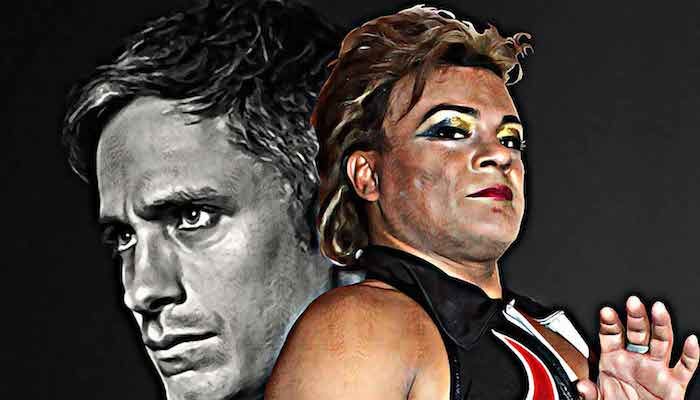Cassandro Review
Cassandro (2023) Film Review from the 45th Annual Sundance Film Festival, a movie directed by Roger Ross Williams, starring Gael García Bernal, Bad Bunny, Roberta Colindrez, Raúl Castillo, Joaquín Cosio, Andrea Pazmino, Mark Vasconcellos, Perla De La Rosa, Yavor Vesselinov, Robert Salas, and El Hijo del Santo. The career of the American-born Mexican exótico wrestler Saúl Armendáriz is the subject of this Roger Ross Williams’ quasi-biopic Cassandro.
Advertisement
Most of the footage in Cassandro is taken from the later career of pro wrestler Saúl Armendáriz, as his best known international ring persona. In 1989, on the advice of his trainer Babe Sharon, he adopted the name ‘Cassandro.’ (A fleeting image suggests he borrowed from a popular soap opera character, but in fact he took the name from a brothel keeper whom he admired.) At this point the story, in terms of theme, really begins. Like other exótico wrestlers, Cassandro put on an entertaining drag show, but expected to lose so that the machismo standards remained supreme and inviolable. Interestingly, while exóticos are meant to represent gay, or at effeminate characters, most of these wrestlers are straight. But on this one occasion, Cassandro has other ideas. Fed up and determined to level the playing field (and at the chagrin of the promoter), he maneuvers the action in the ring so that he triumphs, smiling and preening before a tumultuous crowd. Surprising both the promoter and himself, Cassandro’s peculiar charm wins over the crowd. Thus the campy pro wrestling anti-hero is born, a clarion of same-sex equality. Despite some detractors, Cassandro’s reputation continued to climb more or less unimpeded. Williams and his co-writer, David Teague, invest a few parallel subplots. They toy with Cassandro’s affair with closeted bisexual pro wrestler Gerardo. Apparently the roles in the ring spill over to that in the bedroom. There’s a good natured tussle when Cassandro suggests he might ‘top’ Gerardo at some point, but the split is ultimately political. Gerardo declines Cassandro’s invitation to a highly publicized bout between him and Mexican superstar El Hijo de Santo — in short, coming out for all the world to see. As stated above, these plots are parallel. By and large they don’t much intersect beyond the immediate concerns, plot-wise of Cassandro himself. The exception is the relationship with his mother, Yocasta, a spitfire type matron that stands by Cassandro even as she berates him. And likewise, he stands by her. But apart from this, Cassandro’s other relationships seem pigeonholed. He channels the lion’s share of his energies into the glamor and business of wrestling. Like his colleagues, he has his eye on the prize and, naturally, wants the most bucks for his bang. Hints are dropped here and there throughout the film referring to the unresolved antagonism between him and Eduardo, his estranged father, owing to religious conversion — a very familiar scenario between devout parents and their gay children. Told in flashbacks, there is no real evidence of this. Even their meeting face to face after Cassandro’s big moment with El Hijo seems curiously flat. Where Cassandro likely expected some real engagement, mild-mannered Eduardo seems at a loss for words, offering only what sounds like a rather meek apology. While all the performances are admirable, three of these are true standouts: Bernal is the centerpiece and invests all the camp-happy flamboyance Cassandro has made famous. This movie is all about that and Armendáriz’s groundbreaking changes to professional wrestling. As Yocasta, Perla De La Rosa also furnishes an excellent balance; she’s both loving mom and doting older sister to her son. She has an impressive range. But the scene of Cassandro’s showdown with the silver-masked El Hijo is the most remarkable of all, both in terms of visual power and emotional charge. Cassandro’s reputation for pulling surprise stunts on the canvas precedes him, and with the recent death of his mother, no one knows what to expect. But while he does pull some punches, Cassandro relinquishes the triumph to El Hijo (the actual wrestler playing himself) with extraordinary grace, humility, and goodwill. There are few feel-good moments found in movies quite like this one. Making the most of their time working in the El Paso/Juarez area, Williams and the filmmaking team took careful measure to get all its exciting grittiness and color on film, and it certainly paid off. Yocasta’s viewing (for lack of a better word) in her bedroom was solemn, attended by what looked like the entire neighborhood; the ritual itself had a First Nation tenor. Beneath the surface squalor, we feel the strong sense of community beneath, and the simple enjoyment of making the most of each day. Rating: 8/10 Leave your thoughts on this Cassandro review and the film below in the comments section. Readers seeking to support this type of content can visit our Patreon Page and become one of FilmBook’s patrons. Readers seeking more Sundance Film Festival news can visit our Sundance Film Festival Page, our Film Festival Page, and our Film Festival Facebook Page. Readers seeking more film reviews can visit our Movie Review Page, our Movie Review Twitter Page, and our Movie Review Facebook Page.
Advertisement
Want up-to-the-minute notifications? FilmBook staff members publish articles by Email, Feedly, Twitter, Facebook, Instagram, Tumblr, Pinterest, Reddit, Telegram, Mastodon, and Flipboard.
